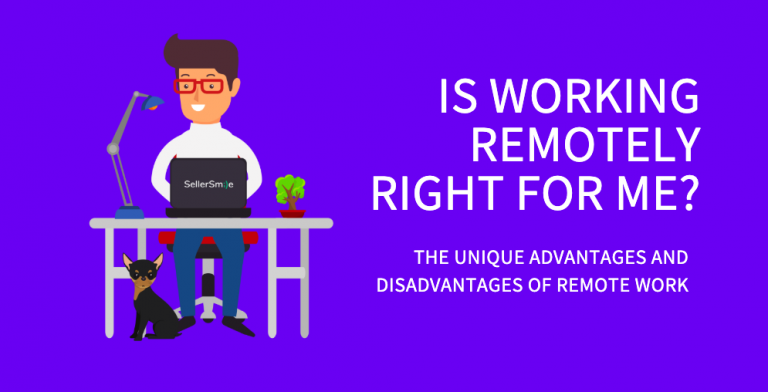What are the unique advantages and disadvantages of remote work? As a remote team ourselves, we recognize that there are certainly both factors at play. While we wouldn’t have it any other way, this work preference is not for everyone out there.
We’re not going to portray remote work to be about sipping Mai Tai’s on the beach (although who doesn’t love a good work vacation?). Real small business owners are savvy enough to know that is simply not the case. In fact, running an e-commerce business can be more difficult than traditional brick and mortar businesses.
Challenges of Remote Work
While there are several advantages to remote work, what of the subtle realities? For instance, how isolating it can be to not have team members in your physical proximity. Or how video chats and phone calls can at times not reveal information that an in-person conversation includes with non-verbal communication factored in.
Having a distraction-free workspace is particularly important when it is required for you to work on challenging projects or be on the phone often. Not only do you need a stable high-speed Internet connection or phone line, but it is also important to have a backup plan in place if your remote work location is compromised in some manner.
Many new remote workers find that they need to train those around them that they are “at work” even if they aren’t at an office. Establishing work-life balance is important for any person but establishing work-life separation is all the more important for the remote worker. if you are working from a home office it does not mean that you are available to handle anything that might arise throughout the day. You may have deadlines to meet, clients to call, and meetings to attend. It is important that your family or significant other recognizes your space.
Co-working spaces offer private offices and meeting rooms where you can hold meetings as a team and with clients. Even if you do not own your own building, it is better to meet in a designated workspace rather than hunting for a table at Starbucks or working in a home.
With a large enough remote team, you may also experience logistical barriers due to having coworkers in different time zones. The time zones also bring a dilemma around time periods that people are working. There are companies whose employees’ schedules only lineup for two hours every day or even not at all. This can make communication around ongoing projects difficult, particularly if there is confusion or a lot of collaboration needed.
Advantages of Remote Work
One practical aspect of remote work is that you can tailor your work environment and work day to best meet your needs and fit into your existing schedule. Perhaps you prefer a home office that is fully equipped with all the equipment that you need to function best. That perfect comfortable chair and view of your garden could motivate you each morning. Perhaps you enjoy working at a coworking space for the variety and natural networking potential. You may prefer a rented office space with your team but also have schedules that can accommodate work at any location.
Another practical element is family life. Many remote workers are better able to attend to their children and home with a schedule that can adapt to demands during the day. Some remote workers enjoy the freedom of working at night if their mornings or afternoons are eaten up with childcare or family obligations. Many give lip service to the goal of work-life balance, but what does that actually look like? Is it turning down the weekend hours that colleagues are putting in so you can spend time with family? Or could it also include the flexibility to meet life demands as they come up with a flexible and adaptable work life?
Beyond the pragmatic flexibility of remote work, there are also benefits to your mindset and personal sense of accomplishment. It is far easier to “own” your work projects and feel a sense of autonomy when you are the primary one responsible for your results. Limiting distracting elements tends to lead to higher productivity. A Stanford study demonstrated that “Home working led to a 13% performance increase”. Time put out an article discussing the potential health ramifications for working remotely. Consider also these 10 ways that commuting is bad for your body and overall health.
The good news: Remote workers who are also self-employed are likely to experience greater levels of job satisfaction and wellbeing than their pals in traditional work roles – Markham Heid
Another reason remote work is a great fit for many people is that it accommodates a range of personality traits that are not met in the traditional work atmosphere. Perhaps you are an introvert who enjoys focused time away from distraction to do your best work. Perhaps you are simply not a people person and find the social obligations of office life particularly draining and distracting from your core work.
If you are a person who craves social activity and responds well to structure and deadlines being enforced by managers, you may prefer the stability of a traditional office job. Remote work may not be for you. This short quiz compares side differences between the two. While many will enjoy the benefits it brings, there is nothing wrong with the tried-and-true approach.
Deciding If A Remote Team is Right Your E-commerce Business
If you’re an e-commerce seller, considering the impacts of remote work is vital, especially in anticipation of rapid growth. As you scale, you may be faced with the decision on choosing an office or being a remote company. Not setting clear expectations for your team early on can result in confusion and conflict. Even with a partially remote team, without proper guidelines, remote team members could feel left out or could miss important information discussed at an in-person meeting.
If you decide to lean on remote work, begin thinking about tools and processes that will help keep all of your team members equally engaged. These considerations will have an impact on how your company disseminates information among the team.
Creating a strong remote team can start as early as the interview process. Asking the right questions during interviews will be essential in successfully hiring remote team members.
Tell me about how you like to work. Here, I’m listening for a thoughtful, deliberate workflow. Does the person have a dedicated space to work from? Do they take regular breaks? Are they methodical about communication and choosing what to work on next?
Why does working remotely appeal to you? Some people want more time with their family, while others are simply more productive at home. Both are perfectly valid reasons. Hating being around people or being averse to being managed, however, are not (at least not for the way we work).
– Alex Turnbull (GrooveHQ blog)
Inc’s “Is Your Personality Type Right for Working Remotely?” states five characteristics of people who can be highly successful working from home:
- They’re introverted
- They’re self-disciplined
- They’re not paranoid
- They’re technically competent
- They know how to sell
While some benefit from the hands-on approach of a manager checking in with them in person every day, managing can be handled remotely with effective results. It just requires adapting to the context at hand by learning how to check in and connect with employees. A good manager will find a way. Managers at the remote companies I am familiar with do just that. And good hiring managers know what traits to look for in remote employees.
Communication is key in remote work as it is across all work contexts. It is all the more useful to implement productivity tools like Slack and Google Meet along with project management software like Trello or Basecamp. Our team uses all of these platforms and we find that it is essential to our workflow. We work to refine our internal processes so we communicate well across time zones and distance. Slack is our most used application and we have a long list of compatible apps and plugins to make full use of that platform.
We use reminders and automatic notifications to assign tasks, schedule calls, and even share personal stories and pictures. While I do not see my coworkers face-to-face every day, I personally feel that we communicate better than any team I’ve been a part of in person. I also am generally aware of their personal lives and feel connected to them. One way our team keeps things personal is to have daily icebreaker questions where we get to know each other better. We also have a weekly retrospective on Fridays where we complete a team building exercise or other activity that helps to give everyone a chance to share their voice.
Conclusion
Every single remote worker I know wouldn’t give it up for the world. The benefits are just too high. They’re willing to deal with the inconveniences and unique problems that remote work brings.
Take time early to consider the proper setting(s) for your business, and how that should reflect on your communication and hiring practices. We at SellerSmile fully endorse this method and believe it has only enhanced our company.
What is your perception of remote work? Do you or your team currently work remotely? If so, what are some of the advantages and challenges you have experienced working remotely?




